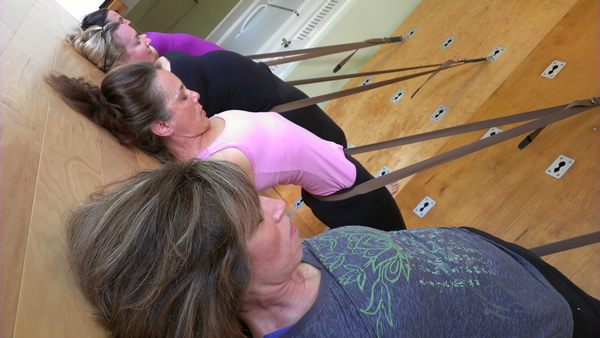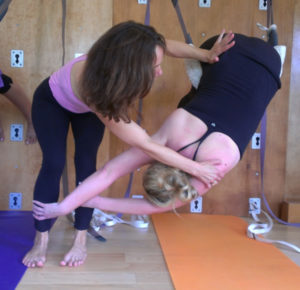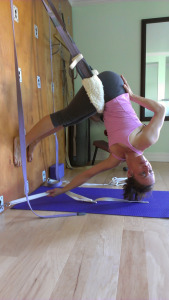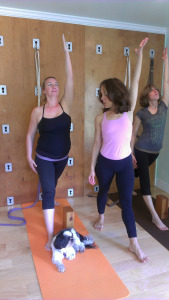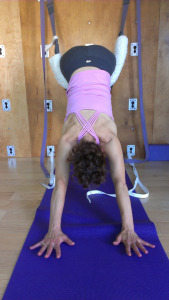Trade fitness fanaticism for serenity with the Yoga Wall
By Nancy B. Loughlin
Published in News Press on February 11. 2014. Posted with permission.
“No pain. No gain.”
So who told you that?
A fitness cult is running rampant in the United States.
I recently attended a spin class, and the instructor wasn’t riding the bike. With a smile, he pointed to his bandaged knee and announced his upcoming surgery.
“But I’ll be back at it soon,” he said. I predict he’ll also be back under the surgeon’s knife.
Blowing out knees and backs, tearing tendons and ligaments, and exploding biceps do not make you a sexy beast.
It is amazing what people are doing to their bodies in the name of losing weight or looking fit.
Good yoga teachers observe the fine line between pain and sensation. Exercise is not supposed to hurt nor is it supposed to exhaust you. Collapsing post-workout, panting and bathed in your own sweat isn’t ideal. Remember that breathing through the mouth is a sign that you’re pushing too hard, and you are likely moving into fight-or-flight.
If your workout keeps you on a steady diet of anti-inflammatories and pain killers and cutting out body parts and replacing them seems reasonable to you, it’s time to change your workout.
Good yoga teachers will also address the difference between ego and curiosity. You can be curious about trying that tricked-out yoga pose, an ultramarathon or nailing 20 burpies. But if you’re doing it to satisfy your ego, the monster has emerged. Vanity is one of those seven deadlies.
Some people appear to have discovered their life passions in athleticism. They belong to running groups, compete in body building competitions and hang out and train with fellow triathletes. Their workouts are synonymous with their social lives and pastimes. More power to them.
But for the rest of humanity, exercising itself should not be the goal; fitness is the means to a full, happy and active life. Contrary to popular opinion, a six-pack of abs is not proof of health. It’s vanity.
Strong hearts, muscles and bones and sounder sleep are just a few excellent byproducts of exercise. But these results can be gained in an hour three times per week. Two hours per day in the gym will devour your life.
“But I need to work out to control my weight!”
It’s your diet.
Overdoing the gym is a strong indicator of a life out of balance. Brian Clement, author and advocate of the vegan, raw lifestyle, has suggested that eating unhealthy, sugar-laden, processed food is a form of self-loathing. Add on the next-day beating at the gym to pound out the calories, and you have a problem.
But you’ll be a good-lookin’ corpse.
Yoga is no different.
Some rooms are heated to 105 degrees. Students’ red faces are contorted into grimaces as they twist their bodies for poses for which they may not be suited. Power yoga students fling themselves into repetitive sun salutations or step to Warrior I and cartwheel to Chaturanga at warp speed.
People don’t know how to be content in the present moment. Patience is non-existent. It’s obvious on the mat.
“Yoga is often dumbed down and sped up. It’s anything to avoid going within,” said Naples Purna yoga teacher Meredith Musick.
Musick looks at the trends with worry.
“In the West, we’re brutal. We don’t think we are doing anything unless we are overdoing it,” she said.
Musick is eyeing what she calls “fitness regimes” that are using asana incorrectly and missing the whole point of yoga which is to help people heal themselves. Yoga is intended to empower people to manage their minds, bodies and spiritual developments.
“Because people have discovered you could get physically fit doing yoga, it’s become a numbers game. Students are packed like sardines in classes, and teachers can’t focus on helping students align their bodies,” she said.
Musick teaches a restorative form of gentle yoga using the Yoga Wall. Fleece-lined straps are fastened into the wall and support the student in the poses.
“We can create space where there was compression,” she said. “Our lifestyles have been compressing the self. This practice allows not only for expansion of the body but of the mind.”
It’s okay to have support and to treat the body gently and with love. Some people need to be convinced of this.
The Yoga Wall is a system of adjustable straps that enables the student to access traction of the spine and hips unlike traditional yoga classes.
A class with the Yoga Wall isn’t a vinyasa flow. The student will hold a pose, experience and shift the alignment for at least a minute, maybe more. The Yoga Wall offers a far more traditional yoga practice where the nuances of each pose are explored. The student is invited to meditate in each pose, clear the mind and allow the push and pull of opposites of Hatha to take full effect.
This is what makes the Yoga Wall ideal for beginners. It is Musick’s experience that new students are intimidated by yoga, by the pretzel machinations. The straps and extended holds are inviting for those with perceived body limitations. Bending deep and reaching long can be frightening for those who have struggled in traditional fitness classes.
The Yoga Wall offers help and support.
In her teaching with the Yoga Wall, Musick emphasizes the Reversing the Age of the Spine series. The spine is the key to slowing rapid aging and calming debilitating stress.
According to Musick, one needs a flexible spine that can withstand long periods of sitting. It’s why yoga was developed in the first place: to attune all moving parts. It cultivates your sensitivity, and a flexible spine is more responsive to the breath.
Energetically, the chakras ride the spine, and if the spine is kinked, the energetic flow of the body is blocked. This impacts people not only physically but mentally, emotionally and spiritually.
So many yoga classes that are steeped in asana and driven to providing a workout don’t even touch upon the energetic lines, loops and spirals that guide prana through an aligned body.
“If you can tap into your loops and spirals, you can manage your healing energy. Using these time-tested practices, you can learn to live and fulfill your life’s purpose,” Musick said.
That kind of fulfillment can’t be found in any gym, nor can it be unearthed in the hospital.
Write to Meredith Musick at [email protected].

